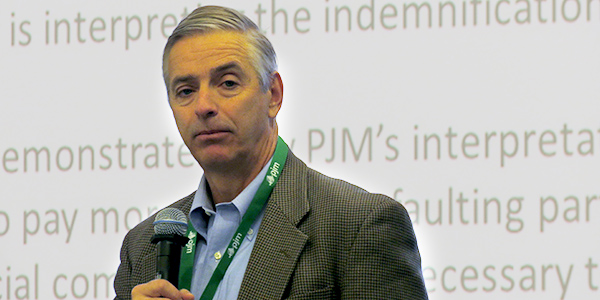By Rich Heidorn Jr.
VALLEY FORGE, Pa. — Shell Energy N.A. came to the Market Implementation Committee on Wednesday to make its case against PJM’s attempts to recover charges from financial transmission rights that the company purchased from failed GreenHat Energy.
After PJM sought more collateral from GreenHat as its losses mounted in April 2017, the company gave the RTO the rights to collect money it said Shell owed it for purchasing some of its FTR portfolio.
PJM was left emptyhanded when Shell said it had already paid GreenHat all it owed. (See Doubling Down – with Other People’s Money.) But the RTO is hoping to recover some of GreenHat’s losses through its indemnification rules on bilateral FTR trades.
PJM Chief Financial Officer Suzanne Daugherty presented the RTO’s interpretation of its indemnification rules to the MIC, saying PJM’s Tariff requires secondary market buyers of FTRs to indemnify PJM and its members for “charges, not net charges” related to the position.
“That was purposeful, the way the wording was written,” Daugherty said.
She said PJM believes the rule is clear. “Shell also thinks it’s clear but disagrees with our interpretation,” she said.
After Daugherty spoke, Shell’s Matthew Picardi outlined his company’s position, saying the indemnification provision does not apply to its transactions. In a Jan. 2 filing opposing its Oct. 1 motion to withdraw proposed Tariff amendments related to its indemnification rules, Shell said that, “contrary to PJM’s characterization,” the company has never acknowledged it “sold” FTRs to GreenHat or otherwise triggered the Tariff’s guarantee and indemnification provision.
Even if the provision does apply, Picardi said, PJM is misinterpreting it by requiring indemnifying parties to pay more than the defaulting party would have owed — a heads-I-win, tails-you-lose proposition.
“PJM believes that netting is not allowed,” Picardi told the MIC. “We disagree with that.”
He presented an example in which the original holder of an FTR would net a profit of $1,859 over one month if it remained owner while a secondary market buyer of the FTR would owe PJM $1,210 because it was denied profits on days when the FTR was in the black.
Shell made the same arguments to FERC in the docket opened by PJM, in which the RTO proposed Tariff changes that would allow indemnifying sellers to assume negatively valued FTR positions on which its indemnified buyer defaulted.
“Such a provision would provide the opportunity for the indemnifying seller to assume ownership of and manage its exposure to the negatively valued FTRs, regardless of the disposition process for the remaining FTR positions in the defaulting member’s FTR portfolio,” PJM said. “At the very least, electing this option would not put the seller in any worse position, since indemnifying sellers are already responsible for the charges associated with those bilateral FTR positions if the indemnified buyer does not pay such costs itself” (ER19-24).
“Such an assumption would allow the indemnifying seller the ability to manage its exposure from its indemnification, but it also protects PJM and its members because the indemnifying seller is assuming the volatility and of course providing the requisite credit,” the RTO added.
After FERC staff issued a deficiency notice seeking more information on its indemnification procedures, however, the RTO asked to withdraw its filing, saying “the proposal does not provide sufficient benefits to the PJM membership to justify PJM continuing to seek approval.” (See “Bilateral FTR Retraction,” PJM MRC/MC Briefs: Dec. 6, 2018.)
Although it opposed PJM’s proposed Tariff change, Shell asked FERC not to end the docket, saying the withdrawal would prevent the commission from ruling on its dispute with the RTO over the existing indemnification rules.
“Members subject to a guarantee and indemnification claim by PJM should be able to assume all of the FTRs subject to the claim,” Shell said. “Under PJM’s proposed tariff amendment, only negatively valued FTRs subject to the claim could be assumed, which leaves the party with PJM’s improper calculation of guarantee payments for any FTRs not assumed.”
Shell said the commission should only close the docket if it simultaneously opens a Section 206 proceeding to determine whether PJM’s interpretation is correct or unjust and unreasonable. “Allowing PJM to withdraw its Tariff amendment without initiating a Section 206 proceeding will leave members with little choice but to file a complaint for relief,” Shell said.
Separately, the RTO has asked a judge in Harris County, Texas, to compel depositions by GreenHat’s principals as a prelude to a potential civil suit against the traders. GreenHat responded with a counterclaim alleging Shell reneged on $70 million it owes for the transactions (Case No. 2018-69829).
Shell responded that the Texas court lacks jurisdiction over GreenHat’s claim. The court rejected Shell’s argument and created a second docket for the companies’ dispute.







